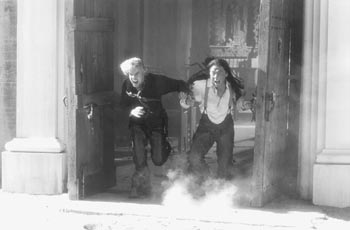![[MetroActive Movies]](/movies/gifs/movies468.gif)
[ Movies Index | Show Times | Santa Cruz Week | MetroActive Central | Archives ]
 Emergency Exit: Owen Wilson (left) and Jackie Chan beat a hasty retreat from trouble in Tom Dey's 'Shanghai Noon.' West Is East Jackie Chan kicks a hole in the old West in sweet 'Shanghai Noon' IN THE SEASON of overproduced, gross, foot-in-the-groin type films, the cleverly titled Shanghai Noon has sweetness and grace to it. Tom Dey's direction is low-key and funny. And Owen Wilson (Bottle Rocket and the hopeless Minus Man) is the best partner Jackie Chan's had since he came to America. Shanghai Noon goes on too long, but all is forgiven because of the efforts of the two stars. The film isn't about how cool, but how essentially gentle and eager to please they are. Today's buddy comedies always seem to be a contest between two actors to see who can bellow the loudest. Chan's self-mockery is well known, though, and the self-effacing Wilson never seriously loses his temper. Wilson plays Roy O'Bannon, the most courtly of gentleman train robbers, unable to maintain resentment even at his henchmen who buried him up to his neck in the desert--Roy chalks the unpleasant incident up to frontier humor. The plot line is a version of the frog-prince fairy tale, with Chan as the frog. Chan plays Chon Wang, a member of the emperor of China's Imperial Guard who joins a trio of agents trying to ransom the emperor's daughter (Lucy Liu), who was taken across the ocean to Nevada as a slave. The emperor's chief of staff decides to let the inept soldier Chon go on the search to America. After the polite bandit O'Bannon robs the train on which Chon is riding, the two team up. Chan doesn't move like he used to, but he can still kickbox, and Shanghai Noon features some exhilarating matches. In one scene, Chon skirmishes with a troop of Crow warriors; and the final battle between Chan and the towering villain (Roger Yuan), which takes place in a half-constructed church bell tower, is as astonishing a sequence as anything Chan's ever done. Shanghai Noon has PG-rated language and even a pot joke. But the one really dubious moment finds Chon waking up married to an Indian chief's daughter, played by Brandon Merrill. No doubt the film took this material straight from the awful comic-relief scenes in The Searchers, since one of the running gags is that Chon Wang's name is misheard as "John Wayne." The other sources are as easily read: Jet Li and Tsui Hark's Once Upon a Time in China and America, Keaton's The General and Sergio Leone. Yet Shanghai Noon displays a core underneath the candy. Late in the movie, Roy says something petty to please a girl at a bordello. She's wondering why he's riding with a Chinaman, and Roy denies his friendship. Chon, unseen, hears through the window. While we realize this is only a screenwriter's device to get the heroes separated for a time, the insult gives texture to the buddying. It reveals the deep fear by Asians, and by all people of color, that under the right circumstances their white friends might betray them. And the real anger Chon shows when Roy jokes about the Chinese man's queue is also a remembrance of how the Chinese were mistreated in America. In between the gorgeous Sierra scenery and Chan's combination of physical magic and comic modesty, the East-meeting-West undercurrents give Shanghai Noon backbone. Chan is what movies once were, and I guess Tom Green is what movies are, but the happy note is that Chan, though aged, is still alive and kicking.
Shanghai Noon (PG-13; 105 min.), directed by Tom Dey, written by Alfred Gough and Miles Millar, photographed by Dan Mindel and starring Jackie Chan and Owen Wilson, opens Friday at the Riverfront Stadium Twin, the Skyview Drive-In, the Scotts Valley 6 and the Fox Theatre. [ Santa Cruz Week | MetroActive Central | Archives ]
|
From the May 24-31, 2000 issue of Metro Santa Cruz.
Copyright © Metro Publishing Inc. Maintained by Boulevards New Media.